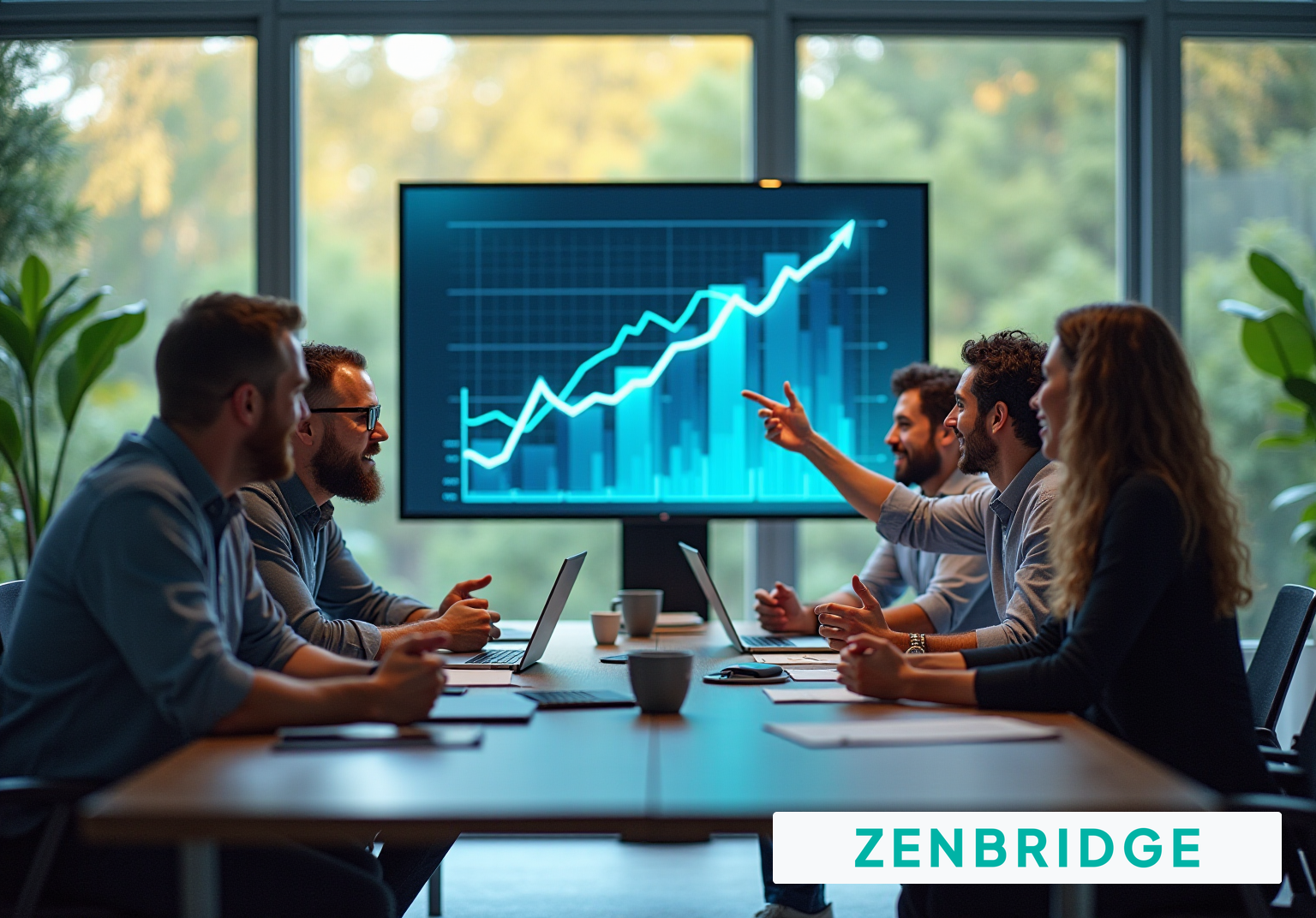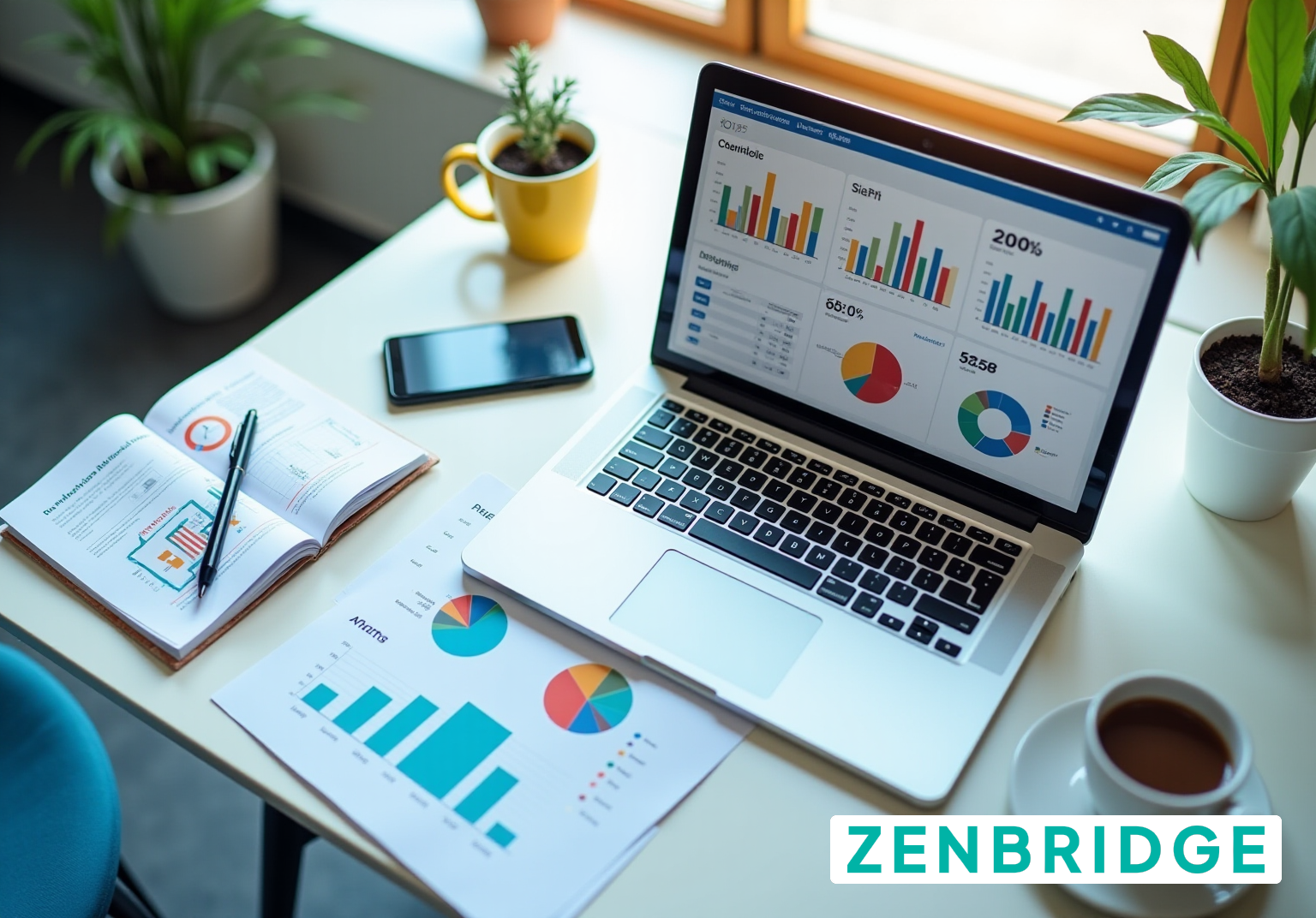
Understanding AI Agency: Definition, Evolution, and Key Traits

Key Highlights:
- AI agencies leverage artificial intelligence to enhance marketing and business operations through automation and data analytics.
- AI-powered solutions, like chatbots, can handle up to 80% of routine customer inquiries, improving response times.
- Companies using AI for sales can increase leads by over 50% and reduce operational costs by 40-60%.
- The global AI market is projected to reach $407 billion by 2027, highlighting the growing importance of AI agencies.
- AI agencies have evolved from basic rule-based systems in the mid-20th century to advanced applications in modern marketing.
- Data-driven organisations are 23 times more likely to acquire new customers and 19 times more likely to be profitable.
- ZenBridge Consulting exemplifies effective AI agency practises, using automation to enhance local SEO and customer engagement.
- Future trends include the rise of generative AI for content creation and the importance of personalization in marketing strategies.
- 87% of global organisations believe partnering with AI agencies will provide a competitive advantage.
Introduction
Hey there! The rise of artificial intelligence is shaking things up in the business world, giving us a new wave of specialised firms we like to call AI agencies. These cool companies are all about using cutting-edge technology to jazz up marketing strategies, boost customer engagement, and streamline processes. They’re paving the way for businesses to innovate and work more efficiently.
But here’s the deal: as the global AI market is skyrocketing, a big question pops up. What really sets these agencies apart in such a fast-changing digital landscape? And how can they tackle challenges like compliance and competition while still delivering tailored solutions? Let’s dive into that!
Define AI Agency: Core Concepts and Functions
Hey there! An AI agency is essentially a specialised group that harnesses artificial intelligence to enhance various aspects of marketing and business operations. These companies collaborate with an AI agency to roll out AI-driven solutions that automate tasks, fine-tune marketing strategies, and boost customer engagement.
So, what do these AI organisations actually do? They develop AI models, implement machine learning algorithms, and provide data analytics services. For example, did you know that AI-powered chatbots can handle up to 80% of routine customer service inquiries? That’s a game-changer for response times and customer satisfaction!
Now, here’s the deal: a study shows that companies using AI for sales can ramp up leads by over 50% while slashing operational costs by 40-60%. By weaving AI into their practises, these firms help businesses optimise operations, cut expenses, and sharpen decision-making skills. This ultimately fosters growth and innovation, especially in a competitive landscape.
And get this—the global AI market is on track to hit $407 billion by 2027! This makes the role of the AI agency in crafting effective marketing and operational strategies more crucial than ever.
If you want to learn more about ZenBridge's AI-driven solutions tailored for small businesses, feel free to drop us a line at contact@zenbridge.com.au. We’d love to chat!
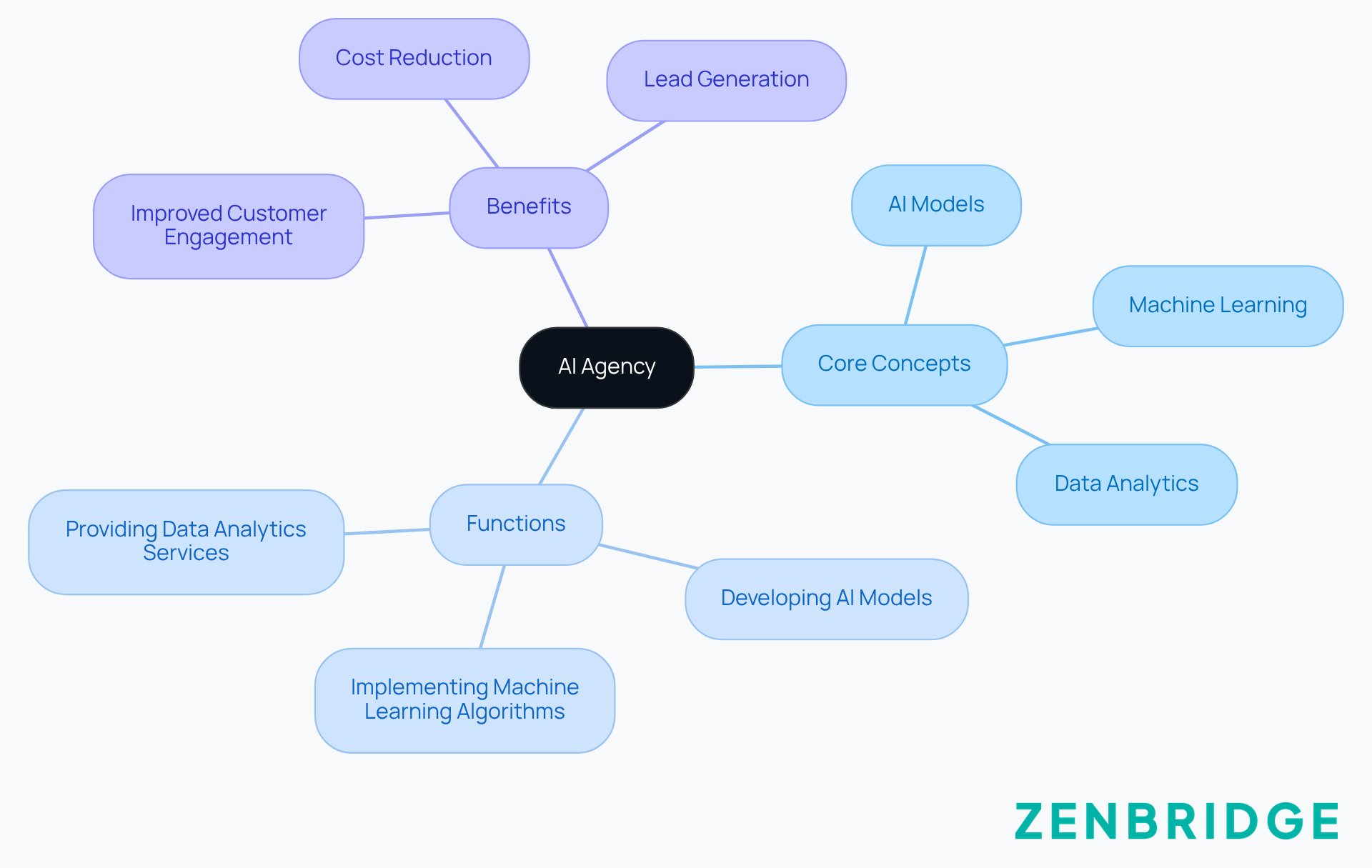
Trace the Evolution of AI Agencies: Historical Context and Development
Let’s dive into the development of AI organisations! It all started back in the mid-20th century when artificial intelligence was pretty much just rule-based systems and basic algorithms. Fast forward to the 1990s, and things took a big turn with the arrival of more sophisticated AI applications. By the early 2000s, companies began to realise just how transformative AI could be, which led to the establishment of AI agencies focused on integrating AI into their marketing and operational strategies.
You might be wondering how widespread this really got. Well, by 2025, around 35% of companies were already incorporating AI into their operations! Today, the AI agency ZenBridge Consulting is leading the charge in digital transformation. They’re using advanced technologies like natural language processing and predictive analytics to boost customer engagement and drive organisational success.
ZenBridge’s AI-driven promotion and automation solutions show just how businesses can enhance their campaigns and refine decision-making processes. This reflects a broader trend in the promotional landscape. The shift from those old rule-based systems to these advanced applications really highlights how service businesses are evolving their operational plans. What do you think about this evolution? Feel free to share your thoughts!
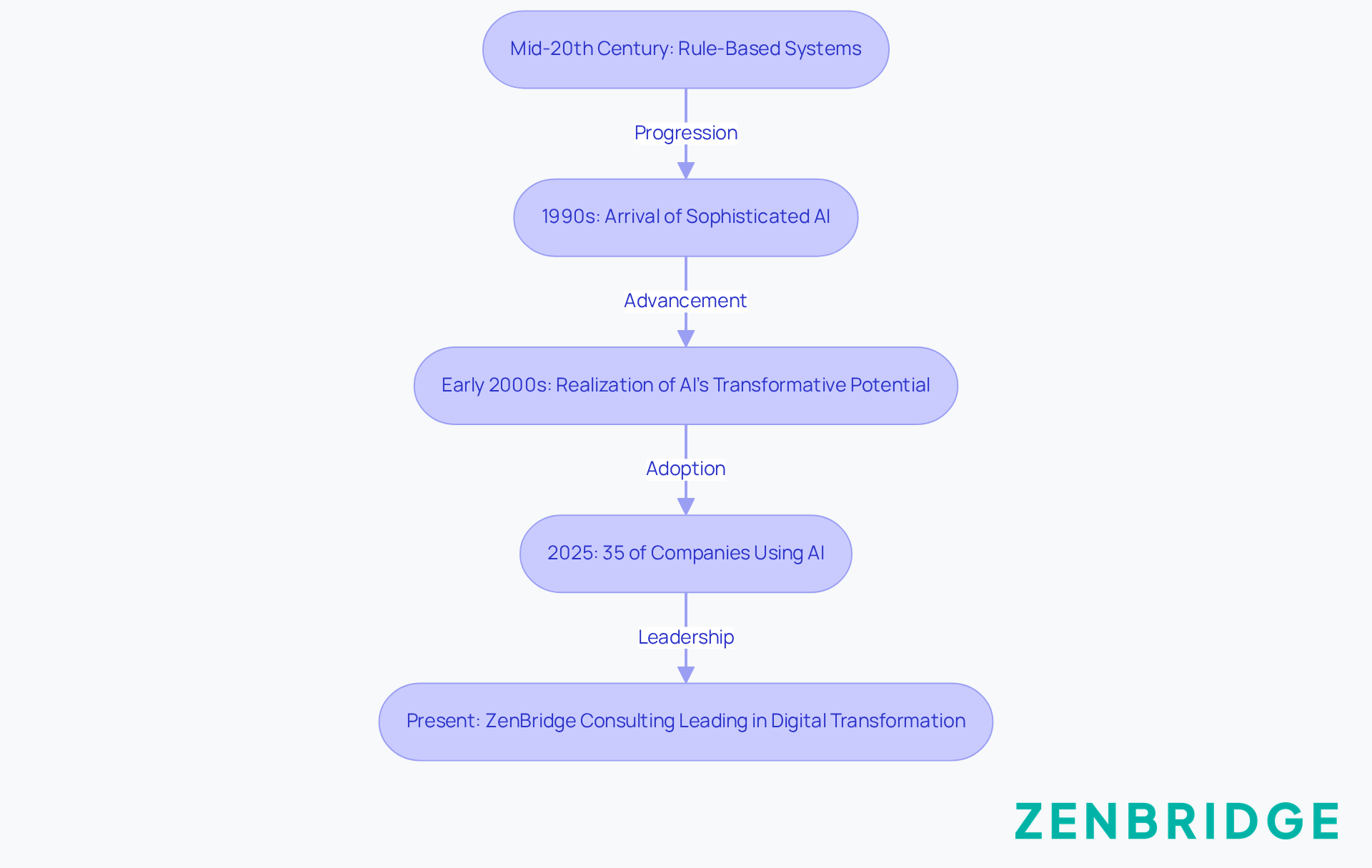
Identify Key Characteristics of AI Agencies: What Sets Them Apart
AI agencies excel when it comes to making decisions based on data. It's super important for understanding what customers need and crafting effective marketing strategies. Did you know that, according to the McKinsey Global Institute, data-driven organisations are 23 times more likely to snag new customers, 6 times more likely to keep them around, and 19 times more likely to turn a profit? That just goes to show how crucial it is to use advanced machine learning algorithms to sift through large datasets. This way, companies can whip up personalised marketing solutions that truly connect with their audiences. Plus, this analytical approach doesn’t just boost efficiency—often by 15-20%—but also helps organisations pivot quickly when the market shifts, keeping them competitive.
Now, let’s talk about how AI organisations focus on partnering with clients. They tailor their AI solutions to tackle specific business challenges. For example, the Pandora Agency crafts strategic content plans based on what customers really want. This fosters innovation and ensures that the strategies are in sync with each organisation’s unique goals. By honing in on these key traits—data-informed insights, flexibility, and a spirit of collaboration—an AI agency is changing the marketing game and setting itself apart from traditional organisations. So, what do you think about this shift? Let’s dive in!
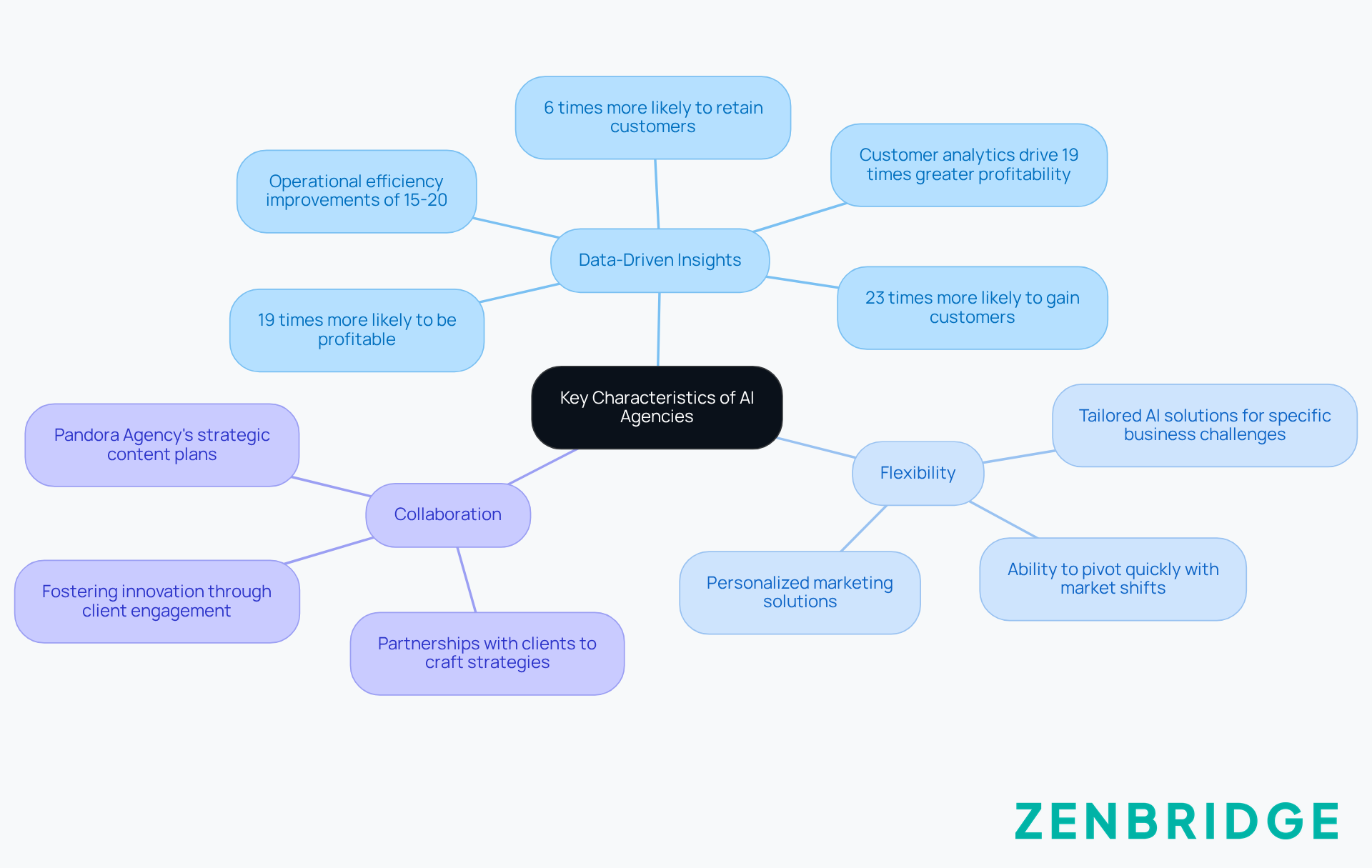
Examine Real-World Examples of AI Agencies: Applications in Business
Hey there! ZenBridge Consulting really shows how an AI agency can make a difference, especially for service-based businesses. With their UpRank service, they automate local SEO and content management, which means clients see a big boost in their online visibility. This not only makes things run smoother but also leads to real improvements in how customers engage and connect with the business.
Now, you might be curious about the numbers. Companies that use AI in their advertising are seeing 20-30% greater ROI on their campaigns compared to those sticking with traditional methods. That's pretty impressive, right?
Let’s not forget about ZenBridge's Ops service. It focuses on automation and workflow consulting, helping businesses become more efficient with strategies like CRM integration and building lead generation funnels. ZenBridge itself is a prime example of an AI agency, as they use AI to sharpen their ad targeting and customer segmentation. This smart use of AI has really boosted their campaign performance, showing how they turn promotional efforts into smooth and effective operations.
Incorporating AI into marketing not only streamlines processes but also helps businesses hit their growth targets. It’s clear that AI-driven solutions have huge potential to transform the business landscape. So, what do you think? Isn’t it exciting to see how technology is reshaping the way we work?
Explore Future Trends in AI Agencies: What Lies Ahead
Hey there! The future of the AI agency looks pretty exciting, right? As more businesses jump on the AI bandwagon, we’re seeing some key trends emerge. One of the big ones is the use of generative AI for content creation, which is really set to boost promotional efforts. Did you know that a survey found 41.29% of marketers think AI-driven email campaigns can actually enhance market revenue? That’s a significant number!
Now, let’s talk about personalization. Organisations are diving into sophisticated data analysis to tailor their approaches to individual consumer preferences. This means they can connect with customers in a way that feels just right for them. Plus, predictive modelling is becoming a hot topic in marketing strategies. A whopping 87% of global organisations believe that partnering with an AI agency will give them a competitive edge.
But it’s not all smooth sailing. As AI regulations evolve, businesses will face the challenge of balancing compliance with innovation. And then there’s agentic AI, which can make decisions on its own! This is going to change the game for operational processes, allowing businesses to deliver even more sophisticated solutions that meet client needs in our fast-paced world.
With the global AI market valued at around $391 billion and expected to grow even more, generative AI will play a crucial role in shaping the future of the AI agency. If you’re curious to learn more about this policy or have any questions regarding your personal information, feel free to reach out at contact@zenbridge.com.au. We’d love to hear from you!
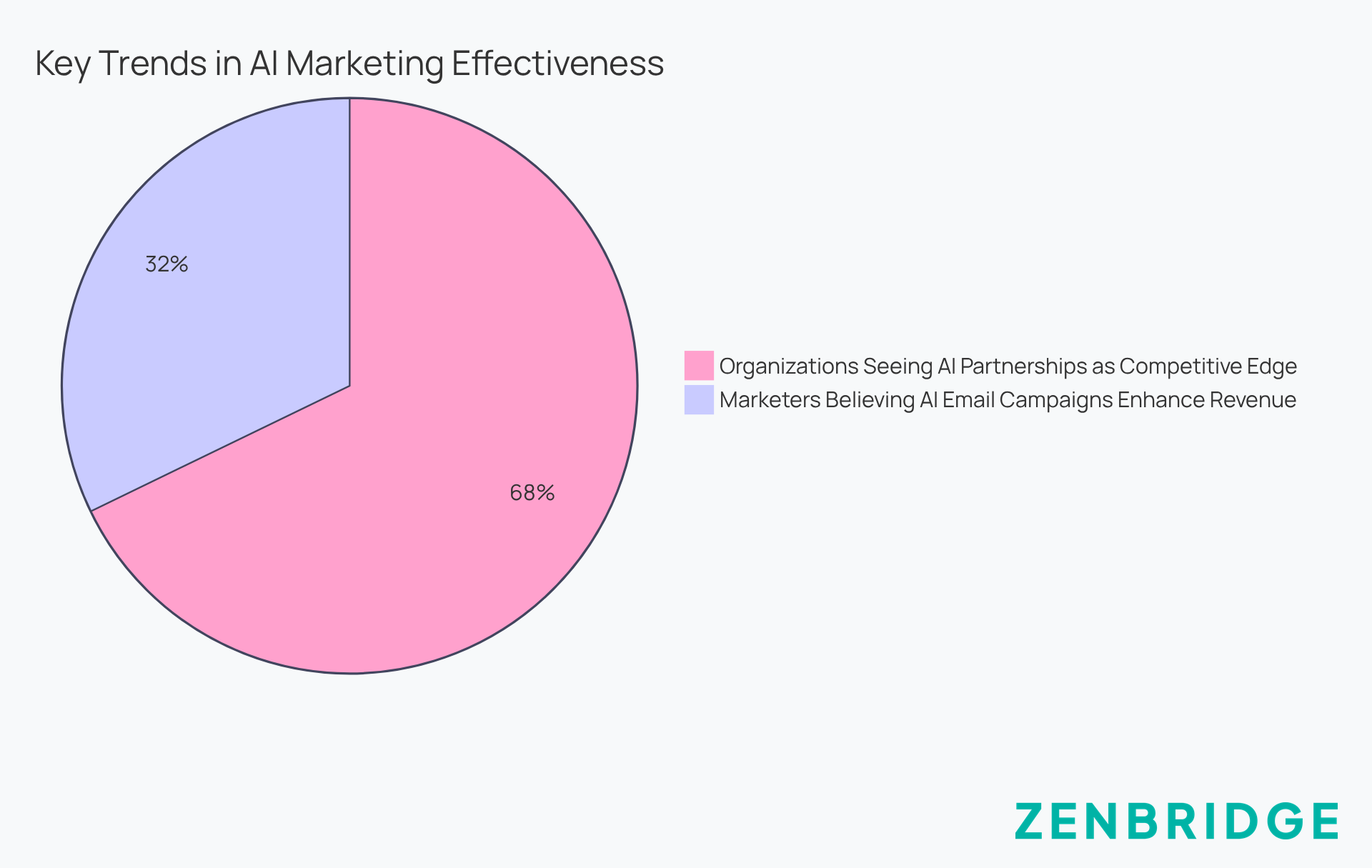
Conclusion
AI agencies have really stepped up as key players in today’s business world, using artificial intelligence to shake up marketing strategies and boost operational efficiencies. By bringing in advanced technologies, these agencies not only automate the boring stuff but also make decision-making smoother, ultimately driving growth and innovation for their clients. As the global AI market keeps growing, it’s clear that AI agencies play a vital role in helping businesses navigate this complex landscape.
Throughout this article, we’ve shared some interesting insights about the journey of AI agencies—from their humble beginnings to their current high-tech applications. We highlighted how organisations like ZenBridge Consulting are at the forefront, using AI to enhance customer engagement and operational success. Plus, the unique traits of AI agencies, like their data-driven methods and client-focused solutions, really set them apart from traditional marketing firms, allowing businesses to achieve some impressive results.
Looking ahead, the future of AI agencies is all about innovation, with trends like generative AI and personalised marketing strategies gaining momentum. As businesses adapt to these changes, the potential for AI to transform operational processes and strengthen customer connexions is huge. Embracing these shifts and exploring how AI can fit into business strategies will be essential for companies wanting to stay ahead in this ever-evolving market.
So, what do you think? Are you ready to dive into the world of AI and see how it can work for you?
Frequently Asked Questions
What is an AI agency?
An AI agency is a specialised group that utilises artificial intelligence to improve various aspects of marketing and business operations, providing AI-driven solutions to automate tasks, optimise marketing strategies, and enhance customer engagement.
What services do AI agencies provide?
AI agencies develop AI models, implement machine learning algorithms, and offer data analytics services. They can also deploy AI-powered chatbots that can manage up to 80% of routine customer service inquiries.
How does AI impact sales and operational costs?
Companies using AI for sales can increase leads by over 50% while reducing operational costs by 40-60%. This integration of AI helps businesses optimise operations, cut expenses, and improve decision-making.
What is the projected growth of the global AI market?
The global AI market is expected to reach $407 billion by 2027, highlighting the increasing importance of AI agencies in developing effective marketing and operational strategies.
When did AI agencies start to emerge?
AI agencies began to emerge in the early 2000s as companies recognised the transformative potential of AI technologies, following advancements in AI applications that began in the 1990s.
What role does ZenBridge Consulting play in the AI agency landscape?
ZenBridge Consulting is a leading AI agency that focuses on digital transformation by using advanced technologies such as natural language processing and predictive analytics to enhance customer engagement and drive organisational success.
How widespread is the use of AI in businesses today?
By 2025, approximately 35% of companies were incorporating AI into their operations, reflecting a significant trend towards the adoption of AI technologies in various industries.
